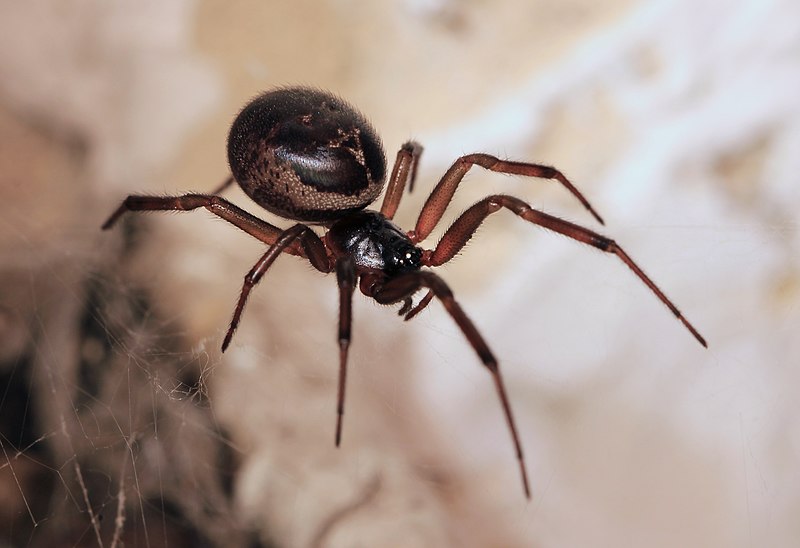Prepare yourselves for the crazy spider story season
- Complaining about the Mainland - 17th August, 2024
- New island designation – is it just greenwash? - 26th April, 2024
- Police and Crime Commissioners – a solution or a problem? - 21st April, 2024
It’s that time of year again, when the media warms up for a summer of ‘False Widow’ scare stories. Not for nothing is Steatoda nobilis known as the Daily Mail Spider. For although it’s more-or-less harmless to most people, it gets rolled out every single year with the same old lame tales of impossible injuries and reactions to a supposed spider bite.
Really, there’s little or nothing to worry about if you’ve got false widows in your house or garden. And here’s why.
They’ve been here for many years
Yes, Steatoda has been in this country and fairly common since the early 20th century. It is now firmly established in most southern counties, where it has become a common and widespread species. It is likely to continue to colonise the UK over the course of the next 10-5 years comfortably as far as the Midlands and perhaps beyond. It is not a new import, nor is it spreading like a plague – although yes, it is gradually extending further north like many other species do as the climate warms up. And despite this long tenure, somehow people and spiders managed to get along fine most of the time.
Unless you’re allergic to it, their venom isn’t likely to harm you
While an allergic reaction to a spider bite is theoretically possible, this has never been recorded, even in people who are allergic to bee or wasp stings. So if you’re the first, you should get to a doctor if it happens. But for the rest of us, the majority of people will not even notice anything. The spiders are not aggressive and most injuries to humans are defensive bites delivered when a spider becomes unintentionally squeezed or pinched. If you are one of the few people unlucky enough to have a reaction, the bite may cause localised pain, minor swelling, and in extreme cases nausea within a few hours (but not days). Symptoms then fade away. If you get any worse reaction than this it’s probably not the spider but something else causing it.
No, your leg will not fall off
Every now and again you will have seen horrific tales of people whose limbs are threatened with amputation, or who have to have operations to ‘drain the poison’. Spider bites cannot directly cause this effect. These gruesome tales come about because like an insect bite or any minor scratch in the skin it’s possible to get an infection as a result – and in the cases reported, it’s a pretty nasty one. But as spider venom is a neurotoxin it isn’t actually capable of causing this effect by itself. That’s why this kind of reported reaction is very rare indeed – it needs not only a minor injury but also an unlucky infection afterwards.
Fumigating your house or school is pointless
Don’t be like Dean Academy in Gloucestershire, who closed an entire school to allow pest control workers to fumigate the building, because they’d spotted a false widow.
Firstly, the danger from the spiders is negligible, so you don’t need to do it anyway. But if you do, there’s always a risk involved with exposure to pesticides, however carefully the work is done.
Secondly, it won’t work. The spiders will just come right back in from outside where they came from in the first place.
And thirdly, it might actually have the opposite effect – by killing everything in the building you are also killing the predators which would naturally get rid of many of the Steatoda – yes, the main predator of spiders is… other spiders.
So just don’t bother. And particularly don’t act solely on the advice of somebody you are about to pay good money to do the job.
How do I get rid of false widow spiders?
Well, obviously, there’s not much point as they’re not likely to harm you, your children or your pets. But if you really want to, the easiest and cheapest way is the same as any other spider – with a cup and card (see a demo picture here), or a commercial product that does the same thing. You are in no danger of being bitten if you handle these spiders gently and don’t squeeze or crush them. Anything else, including pesticides, really won’t work for long – see above. And you really shouldn’t pay someone to put poison in your house or workplace – that’s probably going to be worse for you than the spiders.
Finding out more
Who do you trust more, the Daily Mail or the Natural History Museum?


